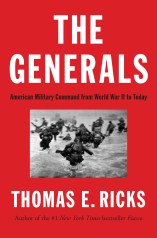Tom Ricks, author of a new book on American generalship, pegs Army General Tommy Franks, shown here arriving in Baghdad shortly after the U.S. invasion of Iraq in 2003, as the U.S. military's worst post-9/11 general.
Few writers have tracked the U.S. military‘s post-9/11 wars more relentlessly than Tom Ricks, first as a reporter – for the Wall Street Journal, then the Washington Post – and more recently as an author, in his definitive, and critical, accounts of the Iraq campaign (Fiasco, The Gamble).
His new book, out Tuesday — The Generals: American Military Command from World War II to Today – deals not so much with wars, as with the men America chooses to lead them. He focuses on the Army – recent U.S. wars have been land wars, after all – and finds it wanting when it comes to holding uniformed leaders accountable for combat snafus. Battleland recently conducted this email chat with Ricks:
Is it true that privates are punished more today for losing a rifle than generals are for losing a war? If so, why?
Yes, it is true. I say that because privates are routinely punished for infractions. But as far as I can tell, no general has been fired for incompetence in combat since Maj. Gen. James Baldwin was fired as commander of the Americal Division in 1971.
Since then, others have been relieved for moral and ethical lapses that are embarrassing to the Army, but not, to my knowledge, for combat ineffectiveness. Indeed, one ineffective general, Lt. Gen. [Ricardo] Sanchez, was outraged that he was not promoted to 4 stars after failing in Iraq in 2003-04.
Why did you write The Generals? How much were you influenced by what you saw in Iraq and wrote about in Fiasco and The Gamble?
This book comes directly out of those two earlier ones. In 2005, while I was writing Fiasco, I went on a Johns Hopkins University staff ride study of the allied campaign in Sicily in 1943.
While we were standing on a hilltop in central Sicily, one of Professor Eliot Cohen’s students related the tale of Omar Bradley firing Terry de la Mesa Allen, commander of the 1st Infantry Division, after Allen won one of the toughest battles of the campaign.
I was stunned. Here I was coming out of Iraq, where generals were failing yet not being removed, and I was being told about the firing of one of the most successful American generals during our first year of World War II.
How could that be? Why had the Army’s approach to leadership and accountability changed so much? That was the beginning of this book.
What is your favorite part of the book?
I have several. I really liked doing researching about George Marshall, who should be better known. I enjoyed sitting in archives and reading his notes and letters, even going through the “desk litter” collected from the drawers of his Pentagon office. Some files I read had penciled letters home from generals during World War II.
But my favorite parts of the book were narratives. Dwight Eisenhower’s train journey from Texas to Washington, D.C., in December 1941, a week after Pearl Harbor, amazed me—not only did he meet the man who would help finance his presidential campaign 11 years later, he also got off the train and was asked the same day by Marshall how to win the war in the Pacific.
Another favorite section is the chapter on how Marine Maj. Gen. O.P. Smith waged the Chosin campaign in the Korean War. He’s another guy who should be better known.
His actions likely saved 15,000 or so Marines from being killed or captured—which would have been the greatest military disaster in American history, much more devastating than Custer’s Last Stand. And he had to do that while dealing with superiors—Gen. Ned Almond and Gen. Douglas MacArthur—who didn’t understand what he was doing or why.
By contrast, the most painful section of the book was writing about the My Lai incident, and the cover-up by the chain of command that went up to the level of the division commander. Four decades later, it is still sickening to read about. When I was working on that section of the book, my wife asked me not to read about it after 7 pm, for fear that it would interfere with my sleep.
Why has the military changed so much since World War II?
Well, not the entire military. The Navy still sticks to the nautical tradition that the skipper is accountable for everything that happens aboard his vessel, so it has not lost the practice of relief. The Marines, being part of the Navy Department, also tend to follow it more.
The Air Force is still kind of all over the place, I think because it is such a comparatively young service, and first was dominated by bomber pilots, then for a few decades by fighter pilots, and now faces a future of drone aircraft.
But the Army is, for my money, the most important of our services. (More Army soldiers have deployed to Iraq and Afghanistan than Marines, Navy and Air Force personnel combined.) And the Army has changed greatly.
Why? Partly, I think, it has to do with the nature of our wars. Korea, Vietnam and Iraq were harder to understand than World War II. How to measure progress in small, messy wars against guerrillas and peasant armies? So it was harder to know who was succeeding and who wasn’t. Also, these wars often were unpopular, which (as I show with the Korean war) made the Army reluctant to relieve generals.
Today being a general is like having tenure.
In World War II, it was expected that a certain percentage of generals would fail and be sacked, and so the occasional relief was seen as evidence that the system was working as expected.
By the Vietnam War, relief was seen as a kind of admission of failure. And so almost no one gets relieved anymore, at least for professional incompetence. (They still get fired for sleeping with subordinates and other moral lapses that embarrass the service.)
Here is a link to an article I wrote for Harvard Business Review about the decline of accountability.
Using your yardstick, who was our best post-9/11 general? And who was the worst?
The worst was Tommy R. Franks, if only because he screwed up two wars. He thought that taking the enemy’s capital meant he had won. So in Afghanistan in 2001 and in Iraq two years later, he took the capital and then took a bow, thinking he had won.
In both cases, the enemy had just begun to fight. They knew they couldn’t take on American forces conventionally and so laid low and looked for American vulnerabilities—and then exploited them.
The best? I think David Petraeus. I have a lot of sympathy for him. He was sent to both Iraq and Afghanistan to try to clean up the messes Franks had made. He did better in Iraq (he got us out of there) than he did in Afghanistan.
There are two big differences between Franks and Petraeus.
Franks was a very conventional general. He was relentlessly tactical, focused on the battlefield. Like a lot of our generals today, he knew how to begin a war, and win the first battle, but he didn’t know how to conclude a war—and in fact seemed to think that was someone else’s job.
Petraeus, by contrast, was unconventional. He was able to think strategically. And he was able to adapt, to change. I think the gutsiest thing he did was reach out to the Sunni insurgents and arrange a ceasefire with them under which they kept their weapons and were put on the American payroll.
That was a case of risk taking—and prudent risk-taking is all too rare in our generals these days.




